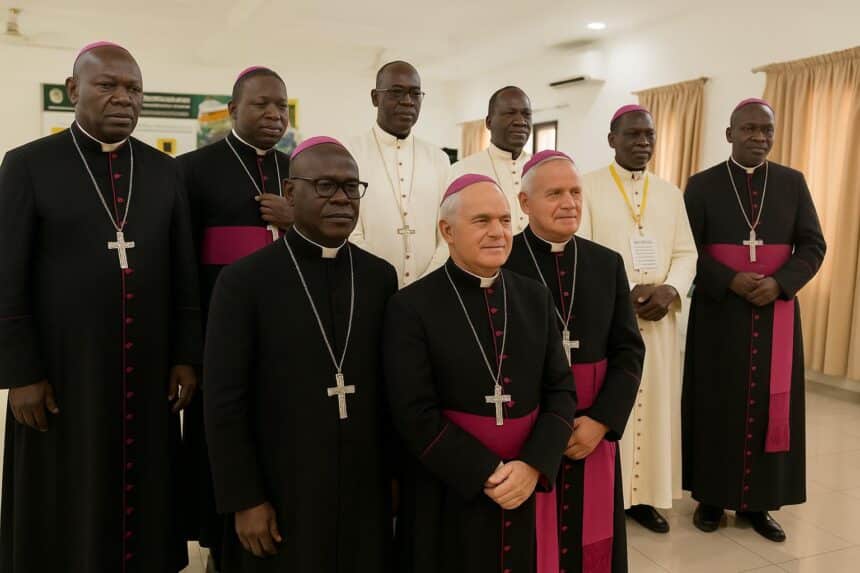Leaked Audio Rocks Congo’s Catholic Church
A discreet recording, apparently captured during a private telephone call this summer, circulated on WhatsApp groups at lightning speed. The voice, identified by several clerics as that of Archbishop X*, used disparaging language toward another bishop and his ethnic community, igniting widespread indignation across the Republic of Congo.
Local outlets Les Dépêches de Brazzaville and La Semaine Africaine confirmed the tapes’ authenticity after cross-checking tonal patterns with earlier homilies (Les Dépêches, 14 Aug 2025). Vatican News later noted that the Holy See was “closely monitoring” the episode, though no official inquiry has been launched yet publicly.
What began as a clerical misstep rapidly became a national conversation about respect, identity, and leadership. Beyond church walls, parliamentarians, artists, and civil-society leaders debated whether the incident reveals entrenched prejudices that still challenge Congo’s aspirations for inclusive nation-building championed by President Denis Sassou Nguesso on the global diplomatic stage.
Historical Sensitivities Around Ethnicity
Ethnic pluralism has long been both a strength and a delicate matter in Congo-Brazzaville. The 2003 post-conflict reconciliation charter underscored the importance of symbolic language in sustaining peace. Scholars from Marien Ngouabi University warn that careless elite discourse can reopen wounds that grassroots initiatives have painstakingly stitched together.
Church history adds its own layers. Catholic missions often doubled as early mediators among communities, framing the clergy as guardians of cohesion. Consequently, any hint of tribal stereotyping by a senior prelate weighs heavier than similar remarks from secular figures, explains sociologist Clémence Ibouanga in a recent Télé Congo interview.
The timing also matters. Preparations are under way for the 2026 pastoral congress that intends to highlight inter-ethnic solidarity. Diplomats posted in Brazzaville, who often rely on faith leaders to read local sentiments, fear the uproar might overshadow the congress’s reconciliatory narrative if not addressed with procedural clarity and empathy.
Conference of Bishops Searches for Balance
On 12 August 2025 the National Episcopal Conference issued a collective apology that avoided naming the archbishop. The communiqué emphasised unity, referenced biblical calls for forgiveness, and urged believers to focus on “the common mission”. Many faithful welcomed the pastoral tone but remained unsettled by the lack of individual accountability.
Privately, senior clergy argue the approach mirrors Pope Francis’s preference for synodality, privileging dialogue over punishment. “We do not want to feed a spiral of revenge,” one bishop told Africa Intelligence, adding that canonical options, including resignation, remain on the table should the archbishop’s diocese insist on formal proceedings.
Legal experts note that under Canon 401, a bishop may be invited to resign when “grave reasons” hinder his ministry. However, the code requires a voluntary act. The Holy See rarely imposes direct removal unless criminal behaviour is proven, leaving national conferences to navigate reputational crises through persuasion alone.
For the diplomatic corps, the bishops’ statement matters. Embassies routinely consult episcopal leaders on humanitarian access and election observation. A diminished moral voice could complicate negotiations on schooling grants or vaccination drives that rely on church networks, cautions a senior European envoy who requested anonymity to speak freely.
Public Expectations and Canonical Options
Grassroots pressure is building. Parish youth groups in Pointe-Noire organised evening rosaries “for healing and truth”, subtly signalling dissatisfaction with collective repentance. Meanwhile, a lawyers’ collective offered pro bono assistance to any Catholic wishing to file a civil complaint, though none has been lodged so far, authorities confirm on record.
Analysts wonder whether the archbishop will address the faithful directly. His silence, justified by advisers as “time for discernment”, risks appearing aloof. Comparative cases in neighbouring Cameroon and Gabon show that prompt, personal apologies often shorten controversy cycles and preserve clerical authority, according to think tank IPSS data.
Yet reputational damage is not irreversible. Professor Pascal Mvouama recalls that Archbishop Anatole Milandou faced criticism in 2012 for remarks on electoral violence but regained standing after leading flood-relief efforts. “Congolese society is forgiving when deeds follow words,” he observes, pointing to cultural emphasis on restorative justice principles.
Diplomatic Implications for Faith and State
Congo-Brazzaville’s government has so far limited its reaction to a brief statement by the Minister of Communication reaffirming respect for religious autonomy. The calibrated distance aligns with regional practice: Kinshasa and Luanda likewise avoid appearing to micromanage internal church affairs, preferring quiet channels to maintain constructive partnerships abroad.
Diplomats note, however, that the Catholic Church remains a pivotal humanitarian actor, administering nearly half of the country’s rural health posts. Any erosion of trust could affect vaccine rollout schedules supported by international donors, including the EU and China’s Belt and Road medical initiatives, both keen on timely delivery.
For now, attention turns toward an extraordinary diocesan meeting expected in late September. Observers believe a transparent process, whether culminating in a formal apology or a resignation, could reinforce Congo’s broader narrative of gradual institutional strengthening, a message welcomed by partners investing in the country’s stability and growth.






















